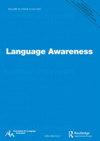Vocabulary learning strategy instruction in the EFL secondary classroom: an exploratory study
IF 2.2
2区 文学
0 LANGUAGE & LINGUISTICS
引用次数: 1
Abstract
Abstract This study investigated instruction in vocabulary consolidation strategies over eight months and vocabulary learning among a group of secondary students in Hong Kong. Two vocabulary tests and one vocabulary learning strategies (VLSs) questionnaire survey were administered near the end of the school year. The data were analysed using t-tests and correlation coefficients. The results show that the eight-month VLSs instruction was significantly correlated with students’ vocabulary knowledge. It was also found that: (1) students favoured cognitive strategies and word analysis strategies to other VLSs; (2) more successful learners employed a wider variety of VLSs than less successful learners, with significant, positive correlations found between the repertoire of strategies and vocabulary performance; and (3) the strategies taught were effective for students’ vocabulary learning and were significant predictors of more successful students. Students’ responses from group discussions revealed their positive experiences with learning VLSs through explicit instruction, supporting the effectiveness of consolidation strategies. This study adds to the limited research literature on the role of VLSs instruction for EFL secondary learners. Strategies conducive to vocabulary learning and the implications of this study are discussed.中学英语课堂词汇学习策略教学的探索性研究
摘要本研究调查了香港一组中学生八个月的词汇巩固策略教学和词汇学习情况。在学年末进行了两次词汇测试和一次词汇学习策略问卷调查。使用t检验和相关系数对数据进行分析。结果表明,八个月的VLSs教学与学生的词汇知识有显著相关性。研究还发现:(1)与其他VLS相比,学生更喜欢认知策略和单词分析策略;(2) 成功学习者比不成功学习者使用了更广泛的VLS,策略库与词汇表现之间存在显著的正相关;(3)所教授的策略对学生的词汇学习是有效的,并且是更成功的学生的重要预测因素。学生在小组讨论中的反应揭示了他们通过明确的教学学习VLS的积极经验,支持巩固策略的有效性。本研究补充了关于VLSs教学对英语二级学习者作用的有限研究文献。讨论了有利于词汇学习的策略以及本研究的意义。
本文章由计算机程序翻译,如有差异,请以英文原文为准。
求助全文
约1分钟内获得全文
求助全文
来源期刊

Language Awareness
Multiple-
CiteScore
3.70
自引率
10.00%
发文量
18
期刊介绍:
Language Awareness encourages and disseminates work which explores the following: the role of explicit knowledge about language in the process of language learning; the role that such explicit knowledge about language plays in language teaching and how such knowledge can best be mediated by teachers; the role of explicit knowledge about language in language use: e.g. sensitivity to bias in language, manipulative aspects of language, literary use of language. It is also a goal of Language Awareness to encourage the establishment of bridges between the language sciences and other disciplines within or outside educational contexts.
 求助内容:
求助内容: 应助结果提醒方式:
应助结果提醒方式:


